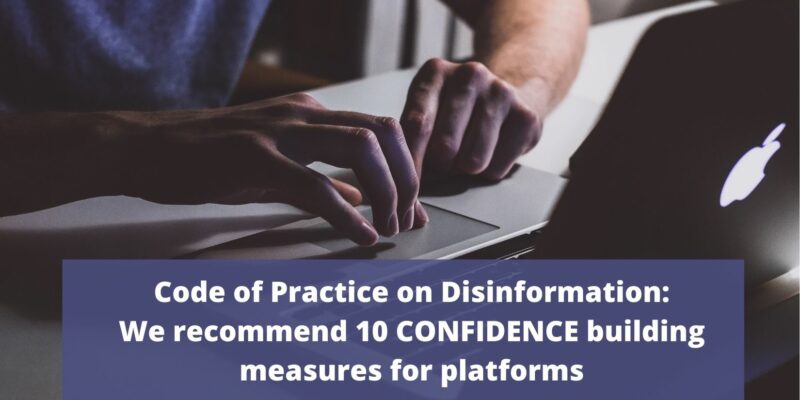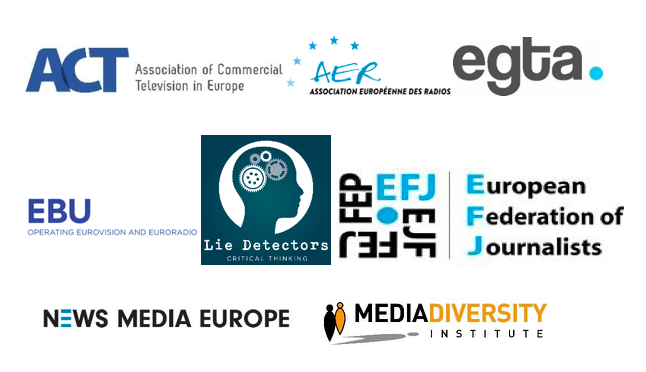10 measures for platforms to tackle disinformation online

The European Federation of Journalists (EFJ) joined the undersigned media organisations and academics in a statement which puts forward ten confidence building measures for platforms to deliver verifiable and tangible actions to tackle disinformation online.
The undersigned members, which are mainly members of the Sounding Board (“SB”) of the Multistakeholder Forum (*) on disinformation online (representatives from media, civil society, journalists, and academia) thank the European Commission for highlighting the crucial role of free and independent media, journalists and academia in the fight against online disinformation during the Covid-19 crisis.
On 13 April, the European Parliament Special Committee on Foreign Interference in all Democratic Processes in the European Union, incl. Disinformation (INGE) is organising, in association with the Committee on the Internal Market and Consumer Protection (IMCO), a hearing on “Interference through advertisement”. The committees will raise ads-related topics, such as election interference through advertisements and ad-funded disinformation, monetisation strategy used by disinformation actors, and the specific Google policy related to advertising and possible detection of messages promoting anti-democratic values. We wish to raise the MEPs’ attention to the ten measures below.
Europe has announced that it will be stepping up its efforts in the fight against online disinformation and publish guidance to strengthen the Code of Practice on disinformation. We call on the Commission to enshrine the following “CONFIDENCE” building measures in the upcoming Guidance. This is an opportunity for the EU to deliver high standards, effective monitoring and adaptation to new threats and for platforms to show that they are committed to protecting and empowering European citizens. All within transparent, verifiable and future-proof frameworks.
- Clear and strong commitments/KPIs – developed, monitored and regularly updated in accordance with EC principles for better self- and co-regulation to enable effective measurement of platforms’ achievements.
- Openness/Transparency. Availability, useability, neutrality and verifiability of data necessary to assess KPIs, algorithms and moderation activities for access, monitoring and analysis initiated by regulators, researchers, journalists, fact-checkers. A mechanism to ensure that entities denied or partially granted access by the platforms can notify/ have recourse via their national Regulator. The Code should also establish a permanent dialogue allowing regulators, researchers, journalists, fact-checkers and other relevant stakeholders to bring-up issues and requests to Signatories.
- No measures interfering with editorial control and media content integrity. As a rule, lawful uploads of content which emanate from editorial media cannot be considered as disinformation. Signatories shouldnot interfere with content that is already under a media provider’s editorial control and subject to specificstandards/media regulation and independent oversight. Signatories should not alter or remove media content to avoid secondary editorial decisions with regards to legitimate content in full respect of editorial decisions and media freedom.
- Futureproof. Annual review process in conformity with the Better Regulation objectives setting out an iterative process to fix gaps, address emerging threats, incorporate new platform designs impacting standalone/cross-platform commitments. For the review, a scoreboard of stand alone and cross platform indicators should aggregate key indicators allowing to measure progress.
- Independent expertise, audits and monitoring to ensure verification of reporting and also in the definition of relevant data sets and formats.
- Demonetisation. Fixing the problem and financing the solution. Clear view on flows of money going to inauthentic accounts and websites, transparency on amounts refunded, consistent information on advertising taken down and efficacy of systems and policies in place.
- Encompassing investments and workforce. Commitments and KPIs on direct workforce, contracted parties and investments in systems for better visibility on commitments made in terms of FTEs (vs contractors) and infrastructure. This data, and other data relevant to KPIs, should be available at Member State level.
- Near perfect information on advertising placement for legitimate advertisers, websites, accounts and other online advertising market participants and end-users. The commitments, associated KPIs, and cross- platform information provided should allow for greater market transparency, common reporting/inputting frameworks to trace across platforms, and in no case serve as a means for Platforms to discriminate access to media.
- Cross-platform and stand-alone KPIs to measure the scale of the problem and efforts carried out within and between the Platforms, including investments and actions undertaken by platforms to tackle disinformation (eg. labelling, suspension, amplification, demotion, demonetisation) at a member state level of analysis.
- Enforcement. Involvement of competent bodies in the monitoring and enforcement of the CoP; including the development of tools to empower the enforcement and oversight of the Signatories’ proper applicationof the Code.

Ravi Vatrapu – Loretta Rogers Chair & Professor, Ted Rogers School of Management, Ryerson University – Sounding Board on the Code of Practice on Disinformation spokesperson
Oreste Pollicino – Professor of Constitutional Law, Bocconi University – management and executive board member of the EU Agency for Fundamental Rights (EFRA)
Gianni Riotta – Professor at Princeton University, Director of the Data lab at LUISS Guido University School of Government, Rome
Trevor Davis – Disinformation research, founder of digital intelligence firm CounterAction. Currently on leave from George Washington University.
(*) The Sounding Board Members, which includes the EFJ, entered the Multistakeholder process which was designed to address a number of key principles adopted by the High-Level Expert Group back in March of 2018. The Multistakeholder Forum on Disinformation comprises two different and autonomous groups. On the one hand, major online platforms for ad exchanges and their trade associations; the advertisers and agencies’ associations and the European advertising self-regulatory body (“the working group”), and on the other hand, representatives of the media, civil society, fact checkers and academia (“the Sounding Board”).






